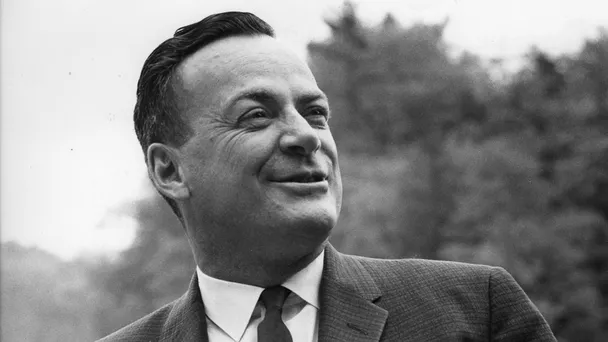Hello fellow Steemians! I am Piotr and I adore Richard Feynman. In his BBC interview from 1981 we can observe not only his profound insight about the nature of the world but also how he thinks, his mental models and life philosophy. Below are my notes but I highly recommend watching the full interview or reading the book by the same name.

"The first principle is that you must not fool yourself and you are the easiest person to fool."
― Richard Feynman, The Pleasure of Finding Things Out
Knowledge/Science always adds (never subtracts). Even when appreciating beauty.
Learn to translate everything you read into reality. Ask: What it really means? What is it saying?
On school: they created a set of rules which if you followed without thinking could produce the answer.
- you would get the answer even if you DIDN'T understand what you were trying to do
- Feynman studied from the “Math for the practical mind” series; he was curious how stuff worked
Think WHY you are doing something. Sometimes an event occurred that make your reasons invalid (working on the atomic bomb even after the Nazis were defeated).
Feynman's Principle: I am NOT RESPONSIBLE for what other people think I am able to do.
- I don't have to be good because they think I have to be good
- even Feynman thought to himself "I haven't done anything important" or "I will never do anything important"
- he remembered that he used to PLAY with physics. He enjoyed it, it never was important.
- he decided he will do things only for the FUN of it
The PRIZE is the PLEASURE of FINDING THE THING OUT, the discovery and the observation that other people use. The Noble Prize and other honors don't matter. Moreover, they bother him.
Understanding Nature Analogy: Gods are playing a game but you don't know the rules of it. Sometimes you get a glimpse. Sometimes something strange occurs that changes how you think up to this moment (like castling in chess). You learn gradually.
In chess: the more you know the rules the less you understand
In Physics: when you discover new things it pulls everything together.
To not know mathematics is a severe limitation in understanding the world.
He invented a Myth for himself: I am actively irresponsible. I don't do anything.
- let somebody else do it
- he's selfish he wants to love physics, everything else job-wise is a distraction
The best way to teach: is to have no philosophy, be chaotic, confusing in a sense that you use every possible way of doing it. Catch people on different hooks. Different things work for different people.
Social science is not a science. They gather the data but don't have laws. Maybe they will discover some. It creates experts on everything, they sound scientific. There is a lot of pseudoscience.
It's hard to really know something, to really understand. He sees how they get the information and he can't believe they've done the checks necessary etc.
When we investigate we shouldn't pre-decide what it is we are trying to do, except to find out more about it. Simply find out more about the world (nature may be simple or like an onion with many layers).
Scientific View: doubt and ask.
It's much more interesting to live without knowing than to have answer which might be wrong.
- he has approximate answers and possible beliefs, different degrees of certainty but he isn't absolutely sure of anything and many things he doesn't know anything about (like why are we here and what it means).
- he doesn't feel frightened by not knowing things, by being lost in the universe without any purpose (which is the way it really is as far as he can tell)
Thank you for reading!  me for more book summaries, notes and thoughts!
me for more book summaries, notes and thoughts!